America’s Cup: What the Skippers Said in Chicago
Published on June 11th, 2016
Chicago, IL (June 11, 2016) – The America’s Cup World Series Chicago got under way in full sun and 90+ degree heat, with huge crowds that came to shop, drink, and enjoy a day of race spectating. The first two items came easy. The racing took some patience.
The three-race schedule was delayed for over two hours before a westerly pushed off the lake breeze to offer one highly challenging test of skyscraper snakes and ladders… which might not count. Yes, it’s complicated.
Scuttlebutt editor Craig Leweck caught up with the skippers to chat about the day.
1st Place – Glen Ashby, Emirates Team New Zealand:
Today – lucky or good?
We identified just before the start that we were in a lulling phase and that the wind was shifting to the left, and managed to get to the windward end of the start line. That positioned us for the next puff that was coming down, which got us into the lead at mark one. Once we were able to gybe and get clear, and then hook into the puff we had, that gave us some helpful separation. So I say we were good over lucky.
Any challenges after that?
Well, we did almost get tangled up with a VIP boat. They were right on the layline for the gybe which caused a few ‘interesting’ moments. But we managed to get our gybe in front of Oracle and then extend out. After that it was about sailing smartly and managing the situation.
Did today’s race course remind you of any other place?
Maybe a good sou-wester in Auckland. We’ve sailed our test boat out in front there, and that area is definitely shifty and puffy.
2nd Place – Jimmy Spithill, Oracle Team USA:
You guys keep finding the front of the fleet at the dicey venues. What’s your secret?
In that kind of stuff you need to stay very agile and be fully heads up. Tommy (Slingsby) did a great job always being a step ahead.
Can you train for these kind of venues?
I think so. We do get days like this, and when they occur, we need to take them as seriously as others and make improvements as a team to excel in them.
Describe what you do now after the race.
We will get together and debrief. We’ll look at all the stuff we did during the race and see what we can improve on for tomorrow and then put it into play.
How’d you feel about getting second?
We are always fighting for better, but realistically, it is about consistency. If we are always banking places in the top few then we’ll be okay.
3rd Place – Nathan Outteridge, Artemis Racing:
What is the challenge in sailing the AC45Fs in these conditions?
These boats go so fast in the puffs and don’t go at all in the lulls, so today is about trying to link the areas of pressure without going out of bounds. We have these imaginary boundaries and we don’t know exactly where they are, and we often get into a bit of pressure but need to tack or gybe because of the boundary. The best is when downwind, we get the pressure that allows us to soak low and parallel the boundaries, or at least delay the gybe. Gybing is really painful in these boats.
These boats don’t tack that fast either. What can you do to get to the pressure when going upwind?
Correct, so you either have to sail a high mode or a low mode to get to the bits of pressure that you need.
How do you feel about your third today?
If we can stay in the top three, we can be happy with that. If you get top three in every race, you will likely win these events.
Explain how television impacts the race schedule.
We have a time slot for television, and we have to get the races completed in that time slot. Races have to be on television to count.
4th Place – Ben Ainslie, Land Rover BAR:
What will be discussed in your debrief from today?
It will be about how we can do a better job dealing with these shifty venues. We didn’t do a great job in New York and we struggled a bit today as well. Sometimes that is just the way it is and sometimes you can pinpoint a few things that could have been done better. We’d definitely have a look at that.
Will improvements be about sail trim or decisions?
Ultimately when it is that shifty and puffy, it is about being in the right place at the right time. It has less to do with sail decisions and more to do with being positioned well to benefit from those massive puffs. When you get clear and get ahead, then you find yourself in a much stronger position. Right now, that’s what we are missing at the moment.
With the course so close to shore, did you have much of a chance to see the wind changes?
It was really hard. As we are sailing in the lee of such tall buildings, the wind is coming down to the water quite quickly. Often times they land so vertically that they spray out. There’s not much time to react but that is the game.
To get better, do you need to start training off the docks of your base?
We did talk about that on the way in. Maybe we need to start training in shiftier conditions. But this is part of the challenge, and everyone is having to face it. You just have to try and do the best job you can.
5th Place – Dean Barker, SoftBank Team Japan:
With better conditions tomorrow, today’s race won’t count. Is that okay with you?
Well, if we don’t get three races in tomorrow within the time period than today’s race will count. We’d much prefer to be doing proper races out there, so hopefully tomorrow will offer more settled conditions.
What do you mean by ‘proper races’?
Today for example, we were trying to get a race off in a short period of time. The winds were not particularly settled, and it would be better to see the races held in more of a consistent breeze. Of course, that’s hard to find here given how the breeze has been so unstable. For sure, the race committee is doing a great job given the conditions.
How do you prepare for these dicey venues?
No other way than just to go sailing in them. It is about trying to read the conditions well, and then knowing how and when to react to the changes. The big thing with our team, as it is a new group, is working on the onboard communication. This is often our undoing. This is where we are making the mistakes.
How narrow is the window to make tactical decisions?
It all comes back to match racing where you have to make split second decisions and then live and die by them. When you are sailing well it seems that you have more time to make those decisions and when you are not doing as well, it feels as if everything is a bit more rushed.
6th Place – Franck Cammas, Goupama Team France:
What went wrong?
Bad start and tactical mistakes.
What do you think about the venue today?
The conditions were not that ‘race-able’ so I hope with tomorrow will come better racing weather.




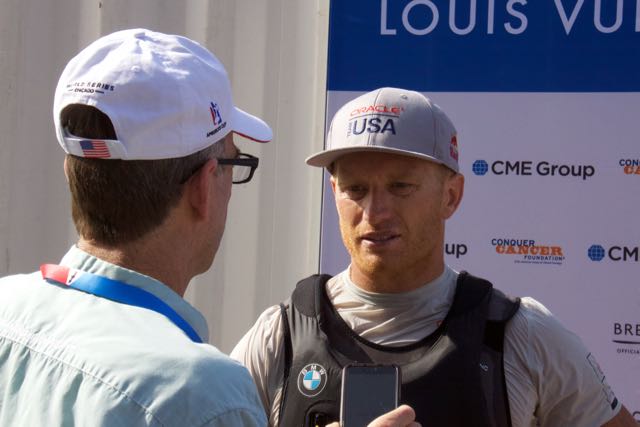
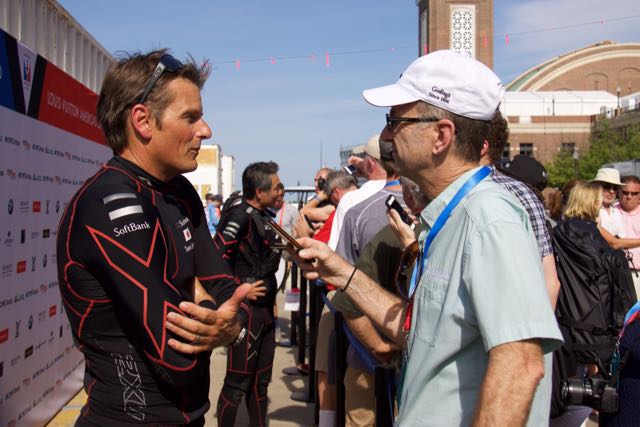

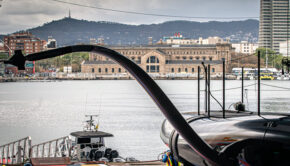
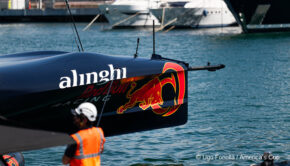
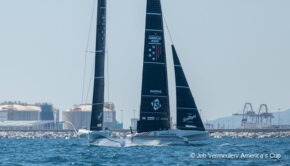
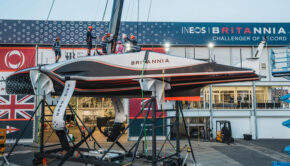
 We’ll keep your information safe.
We’ll keep your information safe.